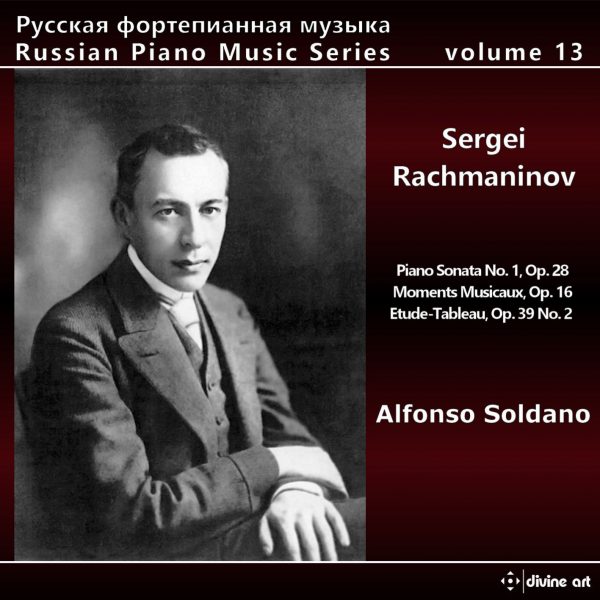American Record Guide
This is fresh and beautiful. He doesn’t sound like anyone else, and he doesn’t sound like he’s been playing these pieces all his life and refining his approach. I took out Vladimir Ashkenazy’s recording on Decca—a real contrast to this. Ashkenazy sounds like the Moments Musicaux are effortless and familiar. He’s faster and smoother, well-oiled, subtle, natural in flow and phrasing. Soldano is swept off his feet by them and sweeps us off our feet with their breathless beauty. He really digs into them where Ashkenazy just tosses them off. Pianists must be in awe of Ashkenazy for his Rachmaninoff; he’s been playing it for a long time and knows every nook and cranny, every trap and splash. But Mr Soldano seems to be discovering it as he plays it (not the case, or he couldn’t possibly play it so well!). He is thrilled and moved, and so are we.
The piano (Steinway D) is beautifully recorded—almost sensual. The sheer beauty of the instrument will take your breath away, and you will be grateful that some pianists and recording engineers let us revel in it.
The Etude Tableau in A minor (Op. 39:2) is a sweet prelude to the fireworks and emotional turmoil of the Musical Moments. The sonata is pretty formal, as sonatas are, and I don’t think Rachmaninoff shines in such music. In fact, I think you almost have to be a pianist to like his two sonatas. And I can’t get deep enough into the music to judge fairly (that is, comparatively) whether Soldano does it full justice.
@divineartrecordingsgroup
A First Inversion Company
Registered Office:
176-178 Pontefract Road, Cudworth, Barnsley S72 8BE
+44 1226 596703
Fort Worth, TX 76110
+1.682.233.4978





![🎧 Listen now to the @purcellsingers' first single from their upcoming album, #ASpotlessRose! ➡️ listn.fm/aspotlessrose [in bio]](https://scontent-dfw5-2.cdninstagram.com/v/t51.71878-15/642752592_1424641949105789_8815810652567824072_n.jpg?stp=dst-jpg_e35_tt6&_nc_cat=106&ccb=7-5&_nc_sid=18de74&efg=eyJlZmdfdGFnIjoiQ0xJUFMuYmVzdF9pbWFnZV91cmxnZW4uQzMifQ%3D%3D&_nc_ohc=aY1NGfNpOoYQ7kNvwE95qN8&_nc_oc=AdkiQK0NYcCCjVpyiJOTHWMbXoPSssU5f0lV2p3CKnGVY-TTzYrv_dyBZPx62gXAfHw&_nc_zt=23&_nc_ht=scontent-dfw5-2.cdninstagram.com&edm=ANo9K5cEAAAA&_nc_gid=6VqUX83yx6rZRM_KH2mbsw&_nc_tpa=Q5bMBQGA4o3rqpwdwzpruw0wIfVeHmNS3_6yjMMnmgY6EWTBmwbe-NjbcudJ1ZdUGMYN2Rbwr6ti0Y9tlw&oh=00_AfxDmzjzD495AzB6Q2N2H-w6AYixLO_0JZ-lI2kVqJUS0A&oe=69AED481)






